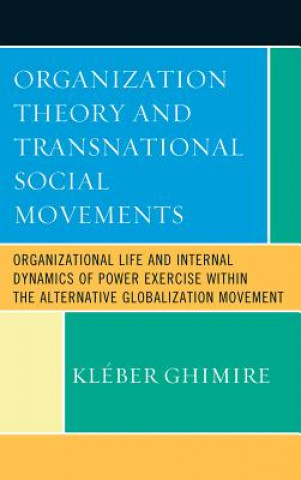
Kód: 04903726
Organization Theory and Transnational Social Movements
Autor Kleber Bertrand Ghimire
Placing it within the theoretical perspectives and debates in Organizational Theory (OT), this book explores the organizational design and internal functioning of a rather emblematic and widely acclaimed transnational social organ ... celý popis
- Jazyk:
 Angličtina
Angličtina - Vazba: Pevná
- Počet stran: 178
Nakladatelství: Lexington Books, 2011
- Více informací o knize

3546 Kč

Skladem u dodavatele v malém množství
Odesíláme za 10-14 dnů
Potřebujete více kusů?Máte-li zájem o více kusů, prověřte, prosím, nejprve dostupnost titulu na naši zákaznické podpoře.
Přidat mezi přání
Mohlo by se vám také líbit
-

Quantum Electrodynamics
2241 Kč -

Oxford Handbook of Business Ethics
1960 Kč -

Psychotherapy with Sexually Abused Boys
2909 Kč -

Dan Ge Performance
731 Kč -

No Statue on the Courthouse Lawn
500 Kč -

Mastering Money: Creating the Money You Want, From the Inside, Out
249 Kč -

Nomad Trader
568 Kč
Darujte tuto knihu ještě dnes
- Objednejte knihu a zvolte Zaslat jako dárek.
- Obratem obdržíte darovací poukaz na knihu, který můžete ihned předat obdarovanému.
- Knihu zašleme na adresu obdarovaného, o nic se nestaráte.
Více informací o knize Organization Theory and Transnational Social Movements
Nákupem získáte 355 bodů
 Anotace knihy
Anotace knihy
Placing it within the theoretical perspectives and debates in Organizational Theory (OT), this book explores the organizational design and internal functioning of a rather emblematic and widely acclaimed transnational social organization: the alternative globalization movement (previously anti-globalization movement). The issue of power in particular remains the central feature of the book. Based on a detailed study of two of the movement's essential constituents (transnational campaigns and the World Social Forum), the book examines the complexity in which certain forms of internal relations or mechanisms of power emerge. In other words, how is the organizational hierarchy conceived and how are important responsibilities executed? What are the principal modes of authority and control? What are the priorities and motives of the leading individuals and groups within the movement? Furthermore, what makes certain echelons, groups, or individuals wield more influence and authority than others, and also justify their legitimacy through diverse means? These questions are especially valid owing to the movement's proper interpretation of power which considers the concentration of power as totally unacceptable. The movement draws lessons from the history of social changes to suggest that political parties and labour movements tended to give rise to the seizure of power by a few, a heavy bureaucracy, and the lack of transparency. Logically, then, a new organizational vision should emerge, avoiding hierarchies and encouraging a more diffused process of power sharing. However, an informal manner of functioning has instead created many ambiguities, with new sets of interests and power relations gradually becoming manifest within the movement. All carefully considered, the book draws three principal conclusions: first, an informal organization structure does not mean that there is an absence of power; second, the exercise of power takes place while denying it; and third, there is seemingly a lack of internal resistanc
 Parametry knihy
Parametry knihy
Zařazení knihy Knihy v angličtině Society & social sciences Society & culture: general Social issues & processes
3546 Kč
- Plný název: Organization Theory and Transnational Social Movements
- Podnázev: Organizational Life and Internal Dynamics of Power Exercise within the Alternative Globalization Movement
- Autor: Kleber Bertrand Ghimire
- Jazyk:
 Angličtina
Angličtina - Vazba: Pevná
- Počet stran: 178
- EAN: 9780739165577
- ISBN: 0739165577
- ID: 04903726
- Nakladatelství: Lexington Books
- Hmotnost: 422 g
- Rozměry: 235 × 156 × 17 mm
- Datum vydání: 08. April 2011
Oblíbené z jiného soudku
-

The Second Sex
202 Kč -

White Tears Brown Scars
286 Kč -

When Helping Hurts
345 Kč -

The Beauty Myth
182 Kč -

Violence and the Sacred
969 Kč -

Wolf Nation
794 Kč -

Good Immigrant
319 Kč -

Stuart
303 Kč -

Population Wars
461 Kč -

The Lucifer Effect
441 Kč -

Superforecasting
306 Kč -

Sensate Focus in Sex Therapy
1021 Kč -

Pleasure Activism
405 Kč -

Drama Of Being A Child
276 Kč -

Alcoholics Anonymous Big Book
591 Kč -

Vulture
432 Kč -

Regarding the Pain of Others
303 Kč -

Rational Optimist
400 Kč -

Poor Economics
306 Kč -

Violence
306 Kč -

Psychopath Free
412 Kč -

Shock Doctrine
410 Kč -

The Divide
306 Kč -

Silently Seduced
318 Kč -

The Feminine Mystique
286 Kč -

Toxic Parents
357 Kč -

Soft Power
361 Kč -

Third Wave
244 Kč -

Posthuman Feminism
544 Kč -

No Logo
306 Kč -

Courage To Heal Workbook
611 Kč -

Illness as Metaphor and AIDS and Its Metaphors
357 Kč -

Down and Out in Paris and London
249 Kč -

Dopesick
286 Kč -

Presence
369 Kč -

Facing the Shadow
779 Kč -

Last Days at Hot Slit - The Radical Feminism of Andrea Dworkin
440 Kč -

A Room of One's Own
234 Kč -

Future Shock
244 Kč -

Problem that Has No Name
63 Kč -

Your Silence Will Not Protect You
383 Kč -

Social Animal
358 Kč -

Attention Merchants
316 Kč -

Who Cooked Adam Smith's Dinner?
303 Kč -

Stiff Upper Lip
303 Kč -

Power Elite
410 Kč -

Eternal Treblinka
576 Kč -

Critical Race Theory (Third Edition)
559 Kč -

Go Ask Alice
249 Kč
Osobní odběr Praha, Brno a 12903 dalších
Copyright ©2008-24 nejlevnejsi-knihy.cz Všechna práva vyhrazenaSoukromíCookies


 Vrácení do měsíce
Vrácení do měsíce 571 999 099 (8-15.30h)
571 999 099 (8-15.30h)